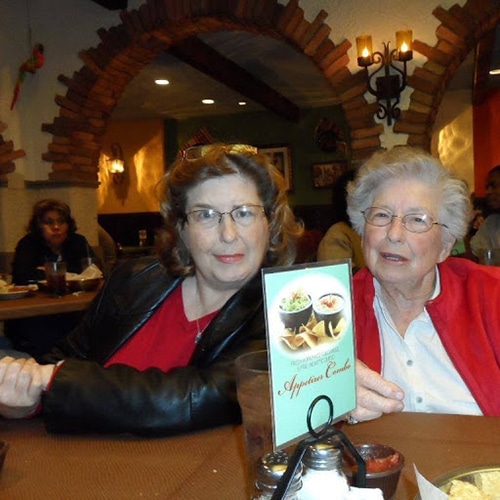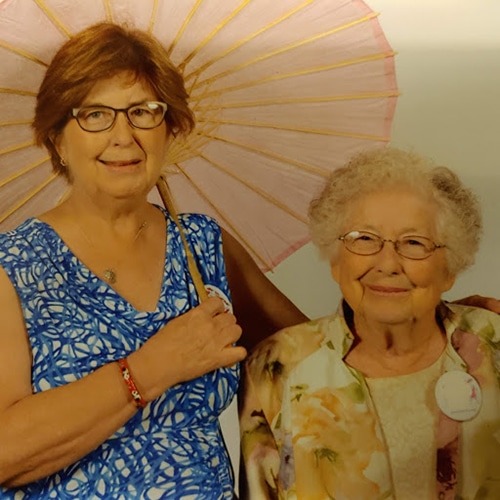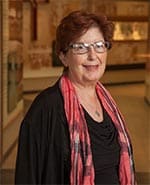It seems to start earlier every year. The Christmas trees go up in stores in September. The holiday commercials start early, too … a barrage of scenes of families gathered together.
Everyone’s smiling.
But I don’t feel like smiling this year.
I lost my mom a few months ago and it makes getting out of bed a chore. Forget the long lists of tasks to make the holidays merry and bright for everyone. Even the thought of decorating feels like too much work. Preparing the family meal was something we always shared. And, don’t get me started on trying to shop for gifts. That was her favorite activity. I’m pretty sure she started on the next year as soon as the last gift was unwrapped.

Mom was the center of the merriment in our family. She would fight me on that label because she never wanted to be the center of attention. She decorated for every holiday. She had a special menu for every holiday. She made sure you knew you were loved. She was the one who taught me to never doubt myself when doing something nice for someone. So here I am, with this person gone, and I am supposed to be happy.

Feeling a sense of doom and gloom closing in, I decided I needed some help. Stephen Hines, MD, medical director of the Golden Cross Academic Clinic at Methodist Dallas Medical Center, was the first person I ever heard use the term “enforced happiness.” Dr. Hines works closely with hospice patients and their families so grief is a subject he knows well.
Dr. Hines suggested I examine what aspects of the season are really meaningful for me. He encouraged me to reorganize the long-standing plans for this year and maybe even future ones.
“To start, prioritize your goals and practice self-care,” Dr. Hines says. “Find time to exercise and relax. Think about what you need to do for you. Find a way to maintain physical, mental, and spiritual health.”
From there, he suggested seeking support. In some cases, that means professional help. Our friends want us to feel better, but a therapist can help you get to a better place. Sometimes sitting in a place of darkness may be more therapeutic than a dinner out with friends.
Here’s some additional advice Dr. Hines shared:
- Be realistic about what your energies and finances will actually allow.
- Only stay as long as you are comfortable at a holiday gathering. If it will be overwhelming, just don’t go. Your family and friends should understand.
- Give yourself some “time outs.” For kids, that is seen as a punishment, but as an adult, it can be restorative.
- Go outside. We are fortunate to have some beautiful winter days with amazing sunrises and sunsets. When we take time to get outside, it can be healing.
- Be selfish. Maintain (or create) rituals and routines that bring meaning to YOU.
Dr. Hines says it may be time to create new rituals that bring meaning to you and plan your holidays around them. I’m working on this. I know this holiday will be difficult and just trying to survive it allowed me to accept my sister’s invitation to her house for Thanksgiving for a change. Then I thought, if we are grieving there are others who are too, so my daughters and I created a new ritual: inviting friends and neighbors to a potluck Thanksgiving at our house.
Dr. Hines ended our conversation with something I found oddly reassuring. “If all else fails, remember that by January 3, everything goes back to reality.”
Get Shine Online delivered to your inbox!
About the author
 Jerri Locke is the Director of Healthy Aging for Methodist Health System. She directs a membership program, Methodist Generations for adults who are at least 55 years of age. She is driven to provide quality programs to help the older adults maintain a healthy life. Jerri has a Bachelors in Education from Abilene Christian University, as well as a Masters in Rehabilitation Counseling from University of North Texas and a Masters in Human Relations and Business from Amberton University. She was born and raised in Oak Cliff and values the diversity, the history, and the community it provides. She’s a mom of two young adults, foster mom to a variety of rescue dogs, and part-time caregiver for her father.
Jerri Locke is the Director of Healthy Aging for Methodist Health System. She directs a membership program, Methodist Generations for adults who are at least 55 years of age. She is driven to provide quality programs to help the older adults maintain a healthy life. Jerri has a Bachelors in Education from Abilene Christian University, as well as a Masters in Rehabilitation Counseling from University of North Texas and a Masters in Human Relations and Business from Amberton University. She was born and raised in Oak Cliff and values the diversity, the history, and the community it provides. She’s a mom of two young adults, foster mom to a variety of rescue dogs, and part-time caregiver for her father.

